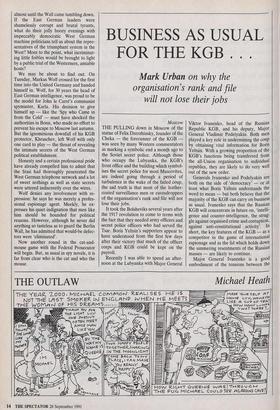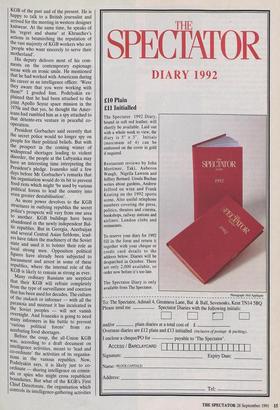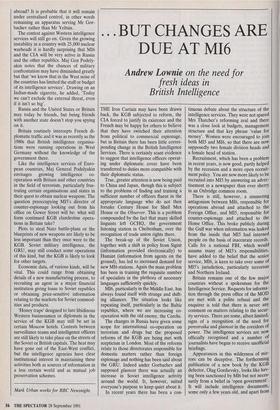BUSINESS AS USUAL FOR THE KGB . . .
Mark Urban on why the
organisation's rank and file will not lose their jobs
Moscow THE PULLING down in Moscow of the statue of Felix Dzerzhinsky, founder of the Cheka — the forerunner of the KGB was seen by many Western commentators as marking a symbolic end a month ago to the Soviet secret police. Although those who occupy the Lubyanka, the KGB's front office and the building which symbol- ises the secret police for most Muscovites, are indeed going through a period of turbulence in the wake of the failed coup, the sad truth is that most of the leather- coated surveillance men or eavesdroppers of the organisation's rank and file will not lose their jobs.
It took the Bolsheviks several years after the 1917 revolution to come to terms with the fact that they needed army officers and secret police officers who had served the Tsar. Boris Yeltsin's supporters appear to have understood from the first few days after their victory that much of the officer corps and KGB could be kept on the payroll.
Recently I was able to spend an after- noon at the Lubyanka with Major General Viktor Ivanenko, head of the Russian Republic KGB, and his deputy, Major General Vladimir Podelyakin Both men played a key role in undermining the coup by obtaining vital information for Boris Yeltsin. With a growing proportion of the KGB's functions being transferred from the all-Union organisation to individual republics, they are likely to do very well out of the new order.
Generals Ivanenko and Podelyakin are both on the side of 'democracy' — or at least what Boris Yeltsin understands the word to mean — but both believe that the majority of the KGB can carry on business as usual. Ivanenko says that the Russian KGB will concentrate in future on, 'intelli- gence and counter-intelligence, the strug- gle against organised crime and corruption, against anti-constitutional activity'. In short, the key features of the KGB — as a competitor in the game of international espionage and as the lid which holds down the simmering resentments of the Russian masses — are likely to continue.
Major General Ivanenko is a good embodiment of the tensions between the KGB of the past and of the present. He is happy to talk to a British journalist and arrived for the meeting in western designer knitwear. At the same time, he speaks of his 'regret and shame' at Khruschev's actions in besmirching the reputation of the vast majority of KGB workers who are `people who want sincerely to serve their motherland'.
His deputy delivers most of his com- ments on the contemporary espionage . scene with an ironic smile. He mentioned that he had worked with Americans during his career as an intelligence officer. 'Were they aware that you were working with them?' I goaded him. Podelyakin ex- plained that he had been attached to the joint Apollo Soyuz space mission in the 1970s and that yes, he thought the Amer- icans had rumbled him as a spy attached to that détente-era venture in peaceful co- operation.
President Gorbachev said recently that the secret police would no longer spy on people for their political beliefs. But with the prospect in the coming winter of widespread shortages leading to violent disorder, the people at the Lubyanka may have an interesting time interpreting the President's pledge. Ivanenko said a few days before Mr Gorbachev's remarks that his organisation would do its bit to prevent food riots which might 'be used by various political forces to lead the country into even greater destabilisation'.
As more power devolves to the KGB structures in outlying republics the secret Police's prospects will vary from one area to another. KGB buildings have been abandoned in the newly independent Bal- tic republics. But in Georgia, Azerbaijan and several Central Asian fiefdoms, lead- ers have taken the machinery of the Soviet state and used it to bolster their role as local strong men. Opposition political figures have already been subjected to harassment and arrest in some of these republics, where the internal role of the KGB is likely to remain as strong as ever. Many ordinary Russians are sceptical that their KGB will refrain completely from the type of surveillance and coercion that has been used for decades. The culture of the stukach or informer — with all the paranoia and mistrust it has inculcated in the Soviet peoples — will not vanish overnight. And Ivanenko is going to need many informers in his battle to prevent various political forces' from ex- acerbating food shortages. Before the coup, the all-Union KGB !vas, according to a draft document on intelligence activities, meant to 'lead and co-ordinate' the activities of its organisa- tions in the various republics. Now, Podelyakin says, it is likely just to co- ordinate — sharing intelligence on crimin- als or spies who might cross republican boundaries. But what of the KGB's First Chief Directorate, the organisation which controls its intelligence-gathering activities abroad? It is probable that it will remain under centralised control, in other words remaining an apparatus serving Mr Gor- bachev rather than Mr Yeltsin.
The contest against Western intelligence services will still go on. Given the growing instability in a country with 25,000 nuclear warheads it is hardly surprising that MI6 and the CIA will be very active in Russia and the other republics. Maj Gen Podely- akin notes that the chances of military confrontation may have diminished greatly but that 'we know that in the West none of the countries has limited the staff or budget of its intelligence services'. Drawing on an Indian-made cigarette, he added, 'Today we can't exclude the external threat, even if it isn't so big'.
Russia and the United States or Britain may today be friends, but being friends with another state doesn't stop you spying on it.
Britain routinely intercepts French di- plomatic traffic and it was as recently as the 1980s that British intelligence organisa- tions were running operations in West Germany without the knowledge of the government there.
Like the intelligence services of Euro- pean countries, Maj General Podelyakin envisages growing intelligence co- operation with Britain and other countries in the field of terrorism, particularly frus- trating certain organisations and states in their quest to obtain nuclear weapons. The question preoccupying MI5's director of counter-espionage looking out from his office on Gower Street will be: what will form continued KGB clandestine opera- tions in Britain take?
Plots to steal Nato battle-plans or the blueprints of new weapons are likely to be less important than they once were to the KGB. Soviet military intelligence, the GRU, may still conduct some operations of this kind, but the KGB is likely to look for other targets.
Economic data, of various kinds, will be vital. This could range from obtaining details of a new manufacturing process, to recruiting an agent in a major financial institution giving loans to Soviet republics or obtaining price-sensitive information relating to the markets for Soviet commod- ities and products.
`Honey traps' designed to lure libidinous Western businessmen or diplomats in the service of the KGB may still be set in certain Moscow hotels. Contests between surveillance teams and intelligence officers are still likely to take place on the streets of the Soviet or British capitals. The heat may have gone out of the East-West conflict, but the intelligence agencies have clear institutional interest in maintaining these activities both as sources of information in a less certain world and as mutual job preservation schemes.
Mark Urban works for BBC Newsnight.




































































 Previous page
Previous page